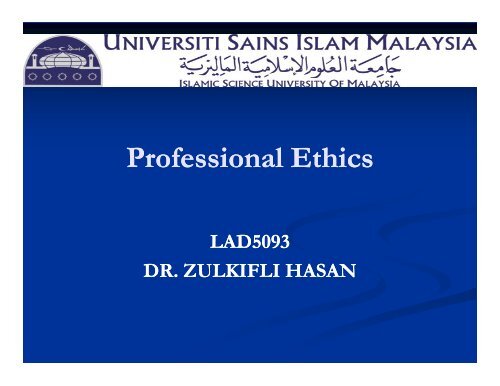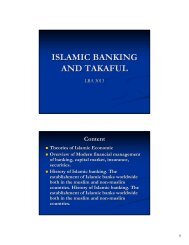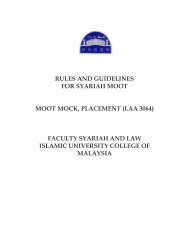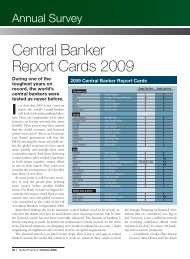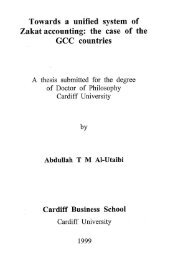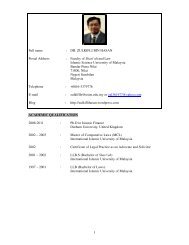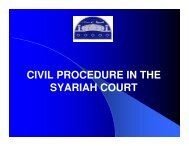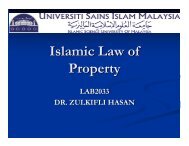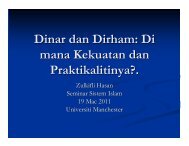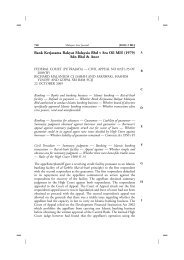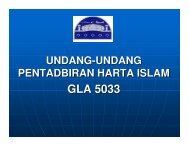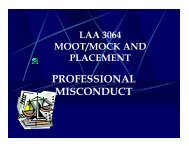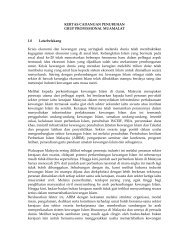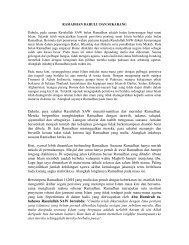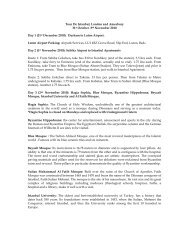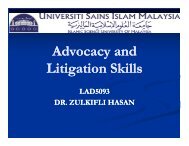Professional Ethics
Professional Ethics
Professional Ethics
You also want an ePaper? Increase the reach of your titles
YUMPU automatically turns print PDFs into web optimized ePapers that Google loves.
<strong>Professional</strong> <strong>Ethics</strong><br />
LAD5093<br />
DR. ZULKIFLI HASAN
Introduction<br />
<strong>Professional</strong> <strong>Ethics</strong><br />
CONTENTS<br />
Legal Profession (Practice and Etiquette) Rules<br />
1978 and Peguam Syarie Rules<br />
Conclusion
Related Provisions<br />
LPA 1976<br />
LPPER 1978<br />
LPPR 2001<br />
SAR1990<br />
PSR (Selangor) 1991 and FT 1993.
Negative View<br />
<strong>Professional</strong> myth lore and narrative.<br />
<strong>Ethics</strong> is an open ended, reflective and critical<br />
intellectual activity not capable of being settled by<br />
agreement or by authority.<br />
<strong>Ethics</strong> is self directed and attempt to lay down a<br />
code binding on others is self contradictory.
Positive View<br />
An ethical rule should be applied in the light of<br />
advancing the trust in the profession and the<br />
confidence in the law as a whole.
Tawhidic Paradigm<br />
A concept of Tawhid is a philosophic foundation<br />
and added value to every Muslim in preserving<br />
what Allah commands and what He forbids.<br />
As Allah knows everything and all mankind is<br />
answerable to Him, the principle of khilafah,<br />
amanah, taklif and al-adl<br />
adl wal Ihsan that derived<br />
form the supreme concept of Tawhid shall be the<br />
foundation of the ethical principles of lawyers in<br />
Islam
<strong>Ethics</strong><br />
The word ethics is derived from the Greek word<br />
ethos, which means character.<br />
In Islam, the word ethic is synonym with the<br />
term adab and khuluq.<br />
Surah al-Qalam<br />
verse 4: Allah says: “And surely<br />
you (Prophet Muhammad) have the best form<br />
of morals”
Definition<br />
Rules of or codes of conduct binding on members<br />
of the legal profession whether as a matter of<br />
contract or of statutory prescription.<br />
A rule of morality and having statutory force.<br />
Standard of conduct which an advocate and<br />
solicitor has which are not in common with non-<br />
advocate and solicitor.
LPPER<br />
Advocate and Solicitor: LP (P&E) Rules 1978<br />
laid down minimum standards of conduct to the<br />
advocate and solicitor.<br />
S 94 (5) of the LPA: A pupil shall mutatis mutandis<br />
be subject to the same control by the DB.<br />
An order may be made prohibiting the pupil from<br />
petitioning the court for admission.<br />
Syarie lawyers: Code of <strong>Ethics</strong>, PSR and syariah<br />
principles.
Why it is so important<br />
1) lawyers must assume personal moral<br />
responsibility for the consequences of their<br />
personal actions.<br />
2) sharp separation between private and<br />
professional morality.<br />
3) Duty of care. <strong>Professional</strong> duties.<br />
Surah An-Nisaa<br />
Nisaa;105<br />
“ we have revealed to you the<br />
book with the truth so that you may judge between<br />
people in accordance with the right way which<br />
Allah has shown you, so not be an advocate for<br />
those who betray us”.
To what extent<br />
1) adopting and adhering to modes of practice<br />
which are fair and just.<br />
2) to preserve ethics in general ie to the profession,<br />
to the client and to justice.<br />
3) to observe any undertaking in conducting<br />
contentious and non-contentious matter.
General and <strong>Ethics</strong> in Court<br />
General ethics: Duty of lawyers to behave<br />
accordingly in their daily life<br />
not to be influenced by others, not to involve in<br />
bribery, not to wary of litigants and to encourage<br />
reconciliation.<br />
In court: Behavior in the process of carrying out<br />
justice and fair play in court.<br />
shall remain calm, not to be influenced by those<br />
around them, to give equal treatment, to avoid<br />
lengthy proceedings, punctual and due respect to<br />
witness
Dual practicing is not Allowed<br />
S 30 (1) (c): shall not apply PC if he is gainfully<br />
employed by any other person other than A&S.<br />
Syed Mubarak Syed Ahmad v Majlis Peguam: : A&S should<br />
exclusively practice the legal profession and not<br />
otherwise.<br />
For pupil: S 12 (3): Shall apply for special leave in<br />
writing from BC before engaging in any employment of<br />
any kind.<br />
S 37 (1) (b): Unauthorized person who willfully<br />
pretends as lawyer is guilty of an offence punishable<br />
with fine up to RM2500 or 6 months imprisonment or<br />
both.
Conduct with candour, courtesy and fairness<br />
R 19 and S 16 PSR<br />
Should not denigrate another lawyer or indulge in<br />
comparative promotion.<br />
Should not allow a deponent to an affidavit to allege<br />
wrongdoing or illegality by another solicitor without first<br />
giving the solicitor concerned an opportunity to answer<br />
the intended allegations.<br />
<br />
when make complaints against another solicitor, to<br />
furnish with copies of document and should not<br />
complaint upon unsubstantiated grounds.<br />
Prophet prohibit us from cursing and making any<br />
wrongful allegations.
Cont..<br />
Abd Allah ibn 'Amr<br />
said, the Prophet used to<br />
say: "The best of you are those who have the<br />
most excellent morals."<br />
Narrated by Abu Hurairah, the Messenger of<br />
Allah said: "The most perfect of the believers in<br />
faith is the best of them in moral excellence, and<br />
the best of you are the kindest of you to their<br />
wives”.
To Uphold Interest of the Client, Justice<br />
and Dignity of the Profession<br />
Rule 16 and S 15PSR- shall acting with ail due<br />
courtesy, fearlessly uphold the interest of his client,<br />
the interest of justice and dignity of the profession<br />
without regards to any unpleasant consequences<br />
either to him or to any other person.<br />
R 31: at all times uphold the dignity of high<br />
standing of his profession.<br />
Maintenance and advancement of trust in the<br />
profession as a whole is the justification for rules<br />
in promoting the interest of the profession.
Cont…<br />
As an agent of the client, the lawyers must try to<br />
assist him as well as possible either it relates to<br />
contentious or non-contentious matter.<br />
The duty to protect the client’s interest however<br />
shall be balanced with the needs to uphold<br />
justice and therefore, the act of hiding facts and<br />
evidences to protect the guilty client is clearly<br />
against the lawyers’ professional ethics.
Cont…<br />
Eg. Family has direct interest with the client.<br />
R27: An A& S shall not appear in any matter he is<br />
directly pecuniarily interested.<br />
The messenger of Allah said: “I’m only a human<br />
being and you bring your disputes to me Perhaps some of<br />
you indulge in logic to prove your assertions and it may be<br />
that I give my decision or the strength of your<br />
argumentation. ……<br />
Neutrality- client’s interest always prevail.<br />
To avoid Conflict of interest in the widest<br />
possible.
Surah Al-An’am<br />
An’am:152<br />
Cont…<br />
“whenever you speak be just even if it affects your<br />
own relatives and fulfill your covenant with Allah”.<br />
Confidentiality, just and not to involve in illegal<br />
activities “afaf<br />
afaf”.<br />
Do not make wrongful allegations and be fair and<br />
respect to witness, third party, other lawyers, and<br />
the court.
Duty of diligence and competence<br />
To complete any work as soon as is reasonably<br />
possible. If not possible please inform the client.<br />
Avoid unnecessary works. Moral responsibility.<br />
Passed to client all information material including<br />
progress and status of the case.<br />
Prophet said: "Allah loves to see one's job done<br />
at the level of itqan or wisdom.“<br />
Trikkon Sdn Bhd v Dato Mahinder Singh Dulku:<br />
Reasons for 9 years delay in filing complaint.<br />
Guilty of misconduct.
Not to accept brief if embarrassed<br />
R 3: if embarrassed<br />
What instances would be considered as<br />
embarrassment<br />
1) Where A&S finds he is in possession of<br />
confidential information as a result of having<br />
previously advised another person in regard<br />
to the same matter.<br />
2) Where there is some personal relationship<br />
between him and a party or a witness in the<br />
proceedings.
Rhina Bhar v Malaysian Bar<br />
The Bar Council had objected for RR Sethu to<br />
represent the Plaintiff on the ground of R3.<br />
Anuar J:-<br />
General rule- member of public authority should<br />
not be professionally engaged in any proceedings<br />
for which the authority is a party or is directly<br />
interested.<br />
Exception-If exceptional circumstances justify any<br />
departure from the general rule, it is the duty of the<br />
solicitor to ensure that interests of the authority are<br />
already protected.
Not to accept brief if professional conduct<br />
likely to be impugned<br />
Sykt Pengangkutan Sakti Sdn Bhd v Tim Joo Khing: a<br />
lawyer should withdraw and entrust the conduct<br />
of the case to another lawyer if he is required to<br />
testify.
Not to accept brief if difficult to maintain<br />
professional independence<br />
Rule 5<br />
Yong & Co v Wee Hood Teck: : A&S have failed to<br />
discharge their duty as conflict of interest arose<br />
when they acted for all three parties i.e. for the<br />
Bank, the developer and the borrower.
Not to accept brief if unable to appear<br />
R 6- if unable to appear.<br />
Syarikat Siaw Teck Hwa Realty & Dev Sdn Bhd v<br />
Malek and Joseph Au: the Dt failed to appear in<br />
the court on the date fixed for hearing of an<br />
appeal at the fed ct.
To be ready on the day of fixed trial<br />
Be ready for trial<br />
Good and cogent reason for postponement<br />
Notice of 48 hours to opposite party<br />
PP v Mokhtar Abd Latif: : Adjourned the hearing<br />
for 14 times.
Not to appear if he will be a<br />
witness<br />
PP v Vengadasalam and Ors: : it is not desirable for<br />
an A&S to appear as a counsel in a trial if he is<br />
required to be a material witness.
Not to communicate with client<br />
of another Lawyer<br />
R 42 & S 37 PSR<br />
The parties are free to communicate directly to<br />
the parties. But if lawyer wants to communicate<br />
directly with the opposite parties he must get<br />
consent from their solicitors.<br />
General rule- cannot directly or indirectly<br />
communicate with the client of another solicitor<br />
without the solicitor’s express consent.<br />
Should avoid direct contact with the opposite<br />
party.
Why<br />
1) the danger of unfair or undue pressure is<br />
presented.<br />
2) the appearance of sharp practice is created.<br />
3) the respect and courtesy to be shown to<br />
another solicitors.<br />
4) likely to lead to acrimony and accusations of<br />
improper behavior.
Not to appear for party represented<br />
by another lawyer<br />
R 54 & S 49 PSR: The purpose of this provision is to<br />
maintain fair and just practice amongst the practitioners.<br />
No element of monopoly or domination and unfair<br />
competition<br />
A client must be free to seek legal advice from any lawyer.<br />
Lawyer owes duty of fairness and courtesy to his fellow<br />
solicitors unless:-<br />
1) he obtains the consent. 2) He undertakes that the<br />
proper professional remuneration of other lawyer has<br />
been paid. 3) In ignorance 4) Other lawyer is unwillingly<br />
or has refused to act further for such party.
What to do<br />
Lawyer should insist on a clear termination of the<br />
previous retainer by the client before he acts in a<br />
new retainer for the same client.<br />
<br />
Inform the previous lawyer of the new retainer.<br />
Previous solicitor who receives request from<br />
another solicitor to transfer a client’s file to that<br />
other solicitors should do so.
Duty of disclosure<br />
R 23 & S 21: To supply court all information as to the probable<br />
length of a case and the possibility of a settlement.<br />
<br />
<br />
<br />
Surah An-Nisa’<br />
Nisa’:135<br />
“O you who believe stand out firmly for<br />
justice as witness to Allah even as against yourselves or your<br />
parent or you kin and whatever it be against rich or poor”.<br />
Not to conceal facts.<br />
Abd Allah reported that the Prophet said: "Truthfulness<br />
leads<br />
to righteousness, and righteousness leads to Paradise. And a<br />
man keeps on telling the truth until he becomes a truthful<br />
person.<br />
Falsehood leads<br />
to Al−Fajur<br />
(i.e.<br />
wickedness,<br />
evil−doing), and Al−Fajur<br />
(wickedness) leads to the (Hell)<br />
Fire, and a man may keep on telling lies till he is written before<br />
Allah, a liar”.
Should charge fees which are reasonable<br />
and proper.<br />
Rule 11 & s 12-Fees<br />
for litigious and contentious<br />
matter.<br />
Basis- 1. time 2. labor and 3. skill required.<br />
Should inform the basis on which the fees will be<br />
charged and the manner in the which the client is<br />
expected to pay the fees and disbursement.<br />
Other reasonably foreseeable payments.<br />
The estimates of the fees and other payments<br />
which shall not vary substantially from the final<br />
amount.
Cont….<br />
When we appoint a person to a position on his<br />
provision. If he takes anything beyond that it is<br />
illegal gains.<br />
In<br />
surah<br />
As-Shua’ra’<br />
verse 18 Allah<br />
“Withhold not things justly due to others”.<br />
says:<br />
Every individual to gain what is really due to<br />
him and not by depriving others
To Disclose To The Client All Circumstances<br />
Rule 25-To disclose to the client all circumstances<br />
of his relation to the parties and any interest in<br />
connection with the controversy which may<br />
influence the client in the selection of counsel.<br />
Prophet said: “if you see any evil deed, prevent it<br />
by your hand if not by your tongue and if not by<br />
your heart”
Not to mislead<br />
Rule 26 & S 24 PSR: Information given by the<br />
lawyer should be reliable and not misleading.<br />
Should not gain a tactical advantage for one’s client.<br />
For eg. Delay the proceedings for technical<br />
mistakes.<br />
Lawyers shall honor the terms of his professional<br />
undertakings given to any party.<br />
Common courtesy in dealing with the documents.<br />
Cheah Cheng Hock v PP: : the advocate has misled the<br />
ct by concealing a document. Convicted of<br />
Contempt of court.
Confidentiality<br />
Rule 35 and S 31- not to abuse confidence<br />
reposed by client.<br />
to keep confidential all communications between<br />
him and his client unless it against the public<br />
interest.<br />
Shall preserve his clients’ confidence and this duty<br />
outlasts his employment.<br />
To prevent a breach of confidentiality for eg<br />
letters in sealed covers.
<strong>Professional</strong> Privilege<br />
It is trite law that communications between<br />
solicitors and their clients are privileged and,<br />
therefore, are inadmissible in evidence in any<br />
proceeding.<br />
The privilege extends to communications<br />
between a solicitor and his client which have the<br />
purpose of seeking or giving legal advice and<br />
communications between a solicitor and third<br />
parties or between the client and third parties<br />
which are made for the purposes of existing or<br />
contemplated legal proceedings.
Why<br />
In order to enable a party to legal proceedings to<br />
prepare his case adequately and to facilitate<br />
uninhibited access to legal advice.<br />
promoting the efficacy of the legal procedure as<br />
a means of just determination of disputes.
Under What Circumstances Does<br />
Privilege Attach<br />
In Three Rivers District Council v Bank of England,<br />
Lord Scott of Foscote said:<br />
‘… legal advice privilege arises out of a<br />
relationship of confidence between lawyer and<br />
client. Unless the communication or document<br />
for which privilege is sought is a confidential<br />
one, there can be no question of legal advice<br />
privilege arising. The confidential character of<br />
the communication… is an essential<br />
requirement.'
Section 126 of Evidence Act 1950<br />
no advocate shall at any time be permitted,<br />
unless with his client’s express consent, to<br />
disclose any communication made to him in the<br />
course and for the purpose of his employment<br />
as such advocate by or on behalf of his client, or<br />
to state the contents or condition of any<br />
document with which he has become acquainted<br />
in the course and for the purpose of his<br />
professional employment, or to disclose any<br />
advice given by him to his client in the course<br />
and for the purpose of such employment…’
Only confidential communication<br />
Teow Chuan v Dato’ Anthony See Teow<br />
Guan:<br />
Facts: The written legal opinion was not<br />
marked private and confidential and was faxed<br />
to the defendant.<br />
‘In our judgment it is settled law that where the<br />
communications with solicitor is not intended to<br />
be confidential, the privilege under section 126<br />
of the Act will not apply.
Waiver of the Privilege<br />
1. Client expressly consent to the waiver of the<br />
privilege<br />
2. Communication is made in furtherance of<br />
illegal purpose<br />
3. Discover that a crime fraud has been<br />
committed upon the commencement of the<br />
employment.
Not to actively carry on any trade<br />
R 44: declared by the BC as unsuitable for A&S<br />
to engage in or be an active partner or salaried<br />
officer in connection therewith.<br />
An A&S shall not be a full-time salaried<br />
employee of any person or corporation as long<br />
as he continues to practise.<br />
Re an advocate: : The counsel allow the office to be<br />
used as a display centre for ladies garments.
No division of costs or profits with<br />
unqualified person or touting.<br />
Rule 51 and 52 & S 46-47-Prohibition of touting and fee<br />
sharing.<br />
Unprofessional and improper conduct. Must not pay,<br />
give, agree to pay or agree to give any commission,<br />
gratuity or valuable consideration to influence any legal<br />
business.<br />
Not to act in respect of gift from the client.<br />
Rhina Bar v Malaysian Bar: : Suspended for 3 months for<br />
breach of touting rules.<br />
Balakhrishnan Devaraj v Patwant Singh Niranjan Singh &<br />
Anor: Touting agreement is against public policy.
Keeping proper records<br />
R 55 and S 51: Shall not withhold the client’s<br />
papers to the detriment of the client<br />
Accurate and up-to-date.<br />
Keep a record at least 6 years if it involves civil<br />
cases.<br />
Upon termination of the retainer and payment<br />
of legal fees a solicitor should hand over all<br />
documents to the client.
Not to advertise<br />
Rule 45 & S 40-41: 41: Shall not solicit work or<br />
advertise by circular, advertisements, touts…..<br />
No A & S shall display outside his office facing a<br />
public road a nameplate larger than in size 2.5<br />
feet by 2 feet.<br />
Rule 46: No personal advertisement.
Why<br />
The need to ensure that the service is a matter of<br />
quality rather than price.<br />
To minimize commercialism in an honorable<br />
profession and to preserve the dignity of the<br />
profession.<br />
Opponents view<br />
Advertising is necessary in order to ensure<br />
competitiveness and<br />
To give access to relevant about the quality and price of<br />
services.
Legal Profession (Publicity) Rules 2001<br />
<br />
<br />
<br />
<br />
<br />
<br />
Rule 4. Not to publicize except in accordance with these Rules.<br />
Rule 5. Publicity within Malaysia., Rule 6. Area of practice.<br />
Rule 7. Letterhead and stationery. Rule 8. Advertisements in legal<br />
and non-legal directory. Rule 9. Nameplate. Rule 10. Building<br />
directory. Rule 11. Business card. Rule 12. Brochure, leaflet and<br />
pamphlet. Rule 13. Journal, magazine and newsletter. Rule 14.<br />
Notice. Rule 15. Interviews with press, radio and television., Rule<br />
16. Participation in seminars, conferences, forums, etc.<br />
Rule 17. Greeting card., Rule 18. Client's publicity.<br />
Rule 19. Documents relating to property transaction., Rule 20.<br />
Books, etc., written by Advocate and Solicitor.<br />
Rule 21. Publicity through the electronic media.Rule<br />
22. Free legal<br />
advice. Rule 23. Publicity outside Malaysia. Rule 24. Responsibility<br />
of Advocate and Solicitor in relation to publicity concerning him.
Approved Information<br />
(a) and (b) the name and address of the firm; (c) the tel<br />
numbers; (d) the business hours; (e) the year established; (f) the<br />
merger or association; (g) historical data (h-l)<br />
the designation<br />
"A&S or Commissioner for Oaths“ or "Notary Public“ “; or<br />
"Agent for Trademarks and Patents“ ; or "consultant“ ; (m) the<br />
area of practice; (n) the language proficiency of the A&S<br />
practising in the firm; (o) the name of the A&S practising in<br />
the firm and whether he is a sole proprietor, partner, legal<br />
assistant or consultant of that firm; (p) the year of admission<br />
as an A&S practising in the firm and whether he has been<br />
admitted as a practitioner in another jurisdiction; (q) the<br />
academic and professional qualifications(r) such other<br />
information which has had the prior written approval of the<br />
Bar Council;
Solicitors’ Account Rules 1990<br />
<br />
<br />
<br />
<br />
<br />
<br />
<br />
<br />
<br />
<br />
<br />
<br />
<br />
<br />
<br />
<br />
Rule 3. Duty to pay money into client account<br />
Rule 4. Moneys to be paid into client account<br />
Rule 5. Client's money in the form of cheque or draft<br />
Rule 6. No other moneys to be paid into client account<br />
Rule 7. Drawing money from client account<br />
Rule 8. Manner of drawing money from client account<br />
Rule 9. Client's money may not be paid into client account in certain cases<br />
Rule 10. Ledger account transfer<br />
Rule 11. Account books to be kept<br />
Rule 12. Mechanical or computerised book-keeping<br />
keeping<br />
Rule 13. Solicitors to notify Bar Council particulars of client accounts and changes<br />
Rule 14. Bar Council may require production of books of account, etc<br />
Rule 15. Manner of delivery of intimation of the amount of a solicitor's costs and<br />
notification relating to application of moneys<br />
Rule 16. Requirements under these Rules to be made in writing<br />
Rule 17. Right or recourse of a solicitor against moneys standing to the credit of a client<br />
account not affected by the Rules<br />
Rule 18. Revocation and savings
Duty to pay money into client account<br />
Rule 3:(1) Subject to rule 9, every solicitor who<br />
holds or receives client's money, or money which<br />
under rule 4 he is permitted and elects to pay into a<br />
client account, shall without delay pay such money<br />
into a client account.<br />
R7: only permits withdrawal of the client’s money<br />
for payment to/on behalf of the client.<br />
Gunasegaran Pararajasingam v PP: : The ct held that to<br />
use one’s client money to settle a solicitor’s liability<br />
to some other client is a criminal offence.
To seek knowledge: PSR<br />
Section 4 PSR- Keep on going seeking knowledge.<br />
Knowledgeable lawyers will ensure that any work<br />
can be done effectively.<br />
Knowledge includes substantive and procedural<br />
laws on certain aspects of life.<br />
Reported by Abu-Dawud<br />
and Al-Tirmidhi<br />
Tirmidhi, that<br />
the Prophet Muhammad said, "An ‘Aalim<br />
(learned<br />
person in the deen) is as much superior to an<br />
‘Aabid<br />
(Worshiper) as the full moon is superior to<br />
all stars”
Disciplinary Action<br />
S 94 (3) (d) of the LPA- For breach of any rule of<br />
practice and etiquette of the profession.<br />
S 94 (2) who has been guilty of misconduct shall<br />
be liable to be 1)Struck off 2) suspended not<br />
exceeding 5 years.<br />
Section 19 of PSR 1991-<br />
1)Struck off or suspend<br />
2)warning or any other order deems fit and<br />
reasonable.
Conclusion<br />
<strong>Professional</strong> ethics are very important in order to<br />
safeguard against breach of the trust and<br />
confidence of the public to the profession.<br />
Lawyers and peguam syarie must have standard of<br />
conducts which are not in common to the layman.<br />
Islam requires lawyers to preserve good ethics,<br />
conscience and piousness.


